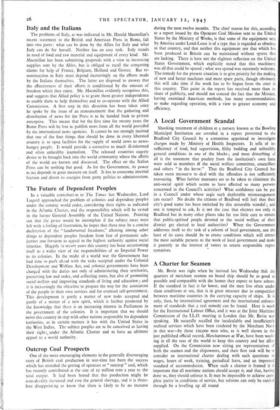The Future of Dependent Peoples
In a valuable contributbn to The Times last Wednesday, Lord Lugard approached the problem of colonies and dependent peoples under the coming world order, considering their rights as indicated in the Atlantic Charter, and the responsibility which will be vested in the future General Assembly of the United Nations. Pointing out that the peace would be incomplete if the subject races were left with a feeling of frustration, he hopes that there may be a concise declaration of the " fundamental freedoms," allotting among other things to dependent peoples freedom from fear of permanent sub- jection and freedom to appeal to the highest authority against social injustice. Happily in recent years this country has been accustoming itself to a wider view of the responsibilities of an Imperial Power to its colonies. In the midst of a world war the Government has had time to push ahad with the tasks accepted under the Colonial Development and Welfare Act, and colonial governments have been charged with the duties not only of administering their territories, preserving law and order, and collecting taxes, but also of promoting social welfare and improving standards of living and education ; and it is increasingly the objective to prepare the way for the association of the people in their own services and for eventual self-government. This development is partly a matter of new tasks accepted and partly of a matter of a new spirit, which is further promoted by the knowledge that there is an increasing. interest in Parliament in the government of the colonies. It is important that we should move this country in step with other nations responsible for dependent territories, as in certain matters it has with the United States in the West Indies. The subject peoples are to be conceived as having their right. under the Atlantic Charter and to have an ultimate appeal to a world authority.






















 Previous page
Previous page